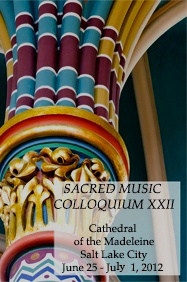(This is posted as a comment to the publisher who had concern on "multiculturalism."
As an immigrant who is not a Latino and Afro-American, I feel that the emphasis on those two ethinic gruops (the publisher specified songs of those groups) make other groups excluded and resembles the superficial political agenda. The importance of the Latin in the Litrugy is stated in Sing to the Lord in length, especialy in # 61, 62, #63 ... To the greatest extent possible and applicable, singers and choir directors are encouraged to deepen their faniliarity with the Latin language.
I help my children learn Latin for the reason stated above, and there are no Catholic schools around here teaches Latin (maybe some high schools as an elective., while most of those schools only focus on learning Spanish instead. (My boy who learned Latin first for 3 years is now learning Spanish in high school, and he is learning it much faster than others.)
The emphasis on Latin is especially true in gatherings of multicultural groups, because it foster the sense of unity as a community of the faith, than emphasizing the diversity. Learning different languages and cultures are important in our society, but in worshipping God the sense of unity should be fostered, then our appreciation of different cultures will be more genuine in our lives, becuase we believe we are one family in GOd.
#12. Participation in the Sacred Liturgy must be "internal, in the sense that by it the faithful join their mind to what they pronounce of hear, and cooperate with heavenly grace. Even when listening to the various prayers and readings of the Liturgy or to the singing of the choir, the assembly continues to participate actively as they "unite themselves interiorly to what the cultural and spiritual milieu of their communities, in order to build up the Church in unity and peace."
One more item, maybe the publisher can help is #20. Seminaries and other programs of priestly formation should train priests to sing with confidence and to chant those parts of the Mass assigned to them. It is very clear that the Church desires Sung Mass with priest chanting and conggoreagation sing responses and Ordinaries (with the goal of singing in Latin #61, #74) and singing Propers. I believe that is important part of "commitment to the Church's vision of liturgical music." I believe reflecting muticulturalism is not the end itself, but a step toward fostering the true unity and active participation of the faithful with active interior participation lest those efforts don't end up becoming a mere "lip-worship."
Here is what the saint of the day teaches us...
“The Eucharist is the life of the people. The Eucharist gives them a center of life. All can come together without the barriers of race or language in order to celebrate the feast days of the Church. It gives them a law of life, that of charity, of which it is the source; thus it forges between them a common bond, a Christian kinship” (Peter Julian Eymard).
Subscribe to:
Post Comments (Atom)

No comments:
Post a Comment